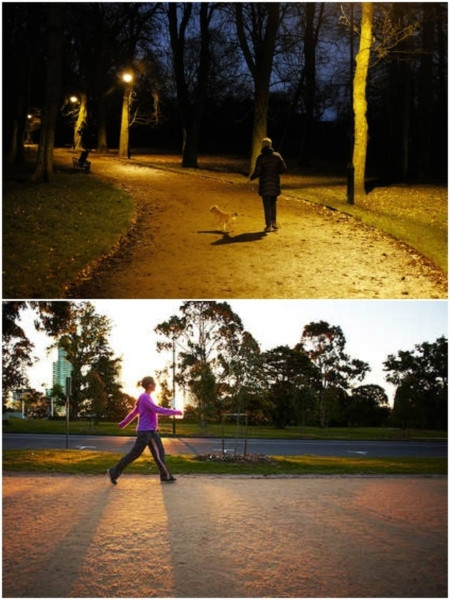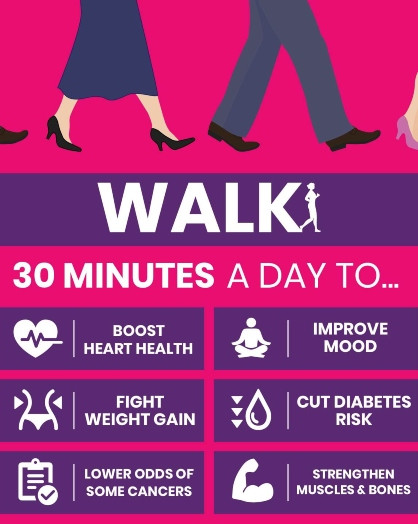How much should you walk daily? An all-in-one guide
Walking is your ticket to a healthier heart, a sharper mind, a brighter mood, and a secret formula to perfect stroll

Is walking just about getting from point A to point B? Think again.
Walking is your ticket to a healthier heart, a sharper mind, and a brighter mood, and a secret formula to the perfect stroll. Whether you’re counting minutes or kilometres, the ideal walking routine isn’t one-size-fits-all. From morning energizers to evening stress-busters, let’s dive into what makes walking one of the best exercises for your overall health.
How much should one ideally walk in a day?
Starting with shorter walks, such as 20-30 minutes, and gradually increasing the duration and intensity helps build stamina and prevent injury. Individuals who are already active may benefit from longer walks, around 45-60 minutes or more, possibly including intervals or faster-paced segments for added challenge. The American Heart Association (AHA) also recommends being active for at least 300 minutes (5 hours) per week for even greater health benefits.
Walking in the morning versus evening
While morning walks can boost metabolism and set a positive tone for the day, evening walks can help unwind and reduce stress accumulated throughout the day. A 2019 study published in the Journal of Behavioral Medicine indicates that evening walks can significantly reduce cortisol levels, helping to alleviate stress.

Health benefits of walking
Walking is a low-impact aerobic exercise that offers numerous health benefits, including:
- Cardiovascular health: Regular walking improves heart health by increasing heart rate, enhancing circulation, and lowering blood pressure and cholesterol levels.
- Weight management: Walking burns calories and supports weight loss or maintenance when combined with a balanced diet.
- Muscle strength and endurance: Walking strengthens leg muscles, enhances flexibility, and improves overall stamina.
- Mental well-being: Walking releases endorphins, reducing stress, anxiety, and depression while promoting a positive mood and cognitive function.

Common walking mistakes to avoid
To maximize the benefits of walking, avoid these common mistakes:
- Overstriding: Taking steps that are too long can strain your joints.
- Poor posture: Slouching can lead to back and neck pain.
- Excessive arm swinging: Wasting energy and causing discomfort.
- Neglecting warm-up and cool-down: Increases the risk of injury.
- Inappropriate footwear: This can lead to blisters or foot pain.
Walking in monsoon: stay alert
As enjoyable as a monsoon walk is, it comes with a higher risk of infections and diseases. It's crucial to stay informed and take precautions such as wearing appropriate footwear, avoiding waterlogged areas, and maintaining hygiene to prevent ailments like dengue and malaria.
Silent heart attack symptoms prevention
Walking can help identify silent symptoms that may precede a heart attack. Pay attention to signs like unusual fatigue, shortness of breath, and discomfort in the chest, back, or arms. Regular walking can improve heart health and potentially alert individuals to these subtle symptoms early.

Is walking alone enough for overall health?
While walking provides substantial cardiovascular benefits, it may not offer sufficient intensity for significant weight loss or muscle development. Complementing walking with activities like a good diet, healthy food, resistance training, high-intensity interval training (HIIT), or flexibility exercises can lead to a well-rounded fitness routine.
Calories burned while walking
On average, walking 1 km burns approximately 50-70 calories, depending on the individual's weight and walking speed. Incorporating walking into daily routines can contribute significantly to overall caloric expenditure.
Conclusion
Walking is beneficial for almost everyone, but certain groups can particularly benefit from making it a regular habit. Sedentary individuals, older adults, those managing stress or mental health challenges, and anyone looking to improve cardiovascular fitness or manage weight can reap substantial rewards from regular walks. The key lies in consistency, gradual progression, and listening to your body’s signals. Consulting with a healthcare provider or fitness professional can provide personalized recommendations for safe and effective walking practices, enhancing overall health, fitness, and well-being.



















COMMENTS
Comments are moderated and generally will be posted if they are on-topic and not abusive.
For more information, please see our Comments FAQ